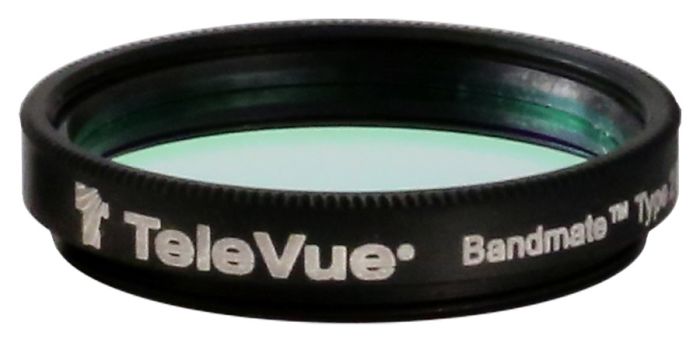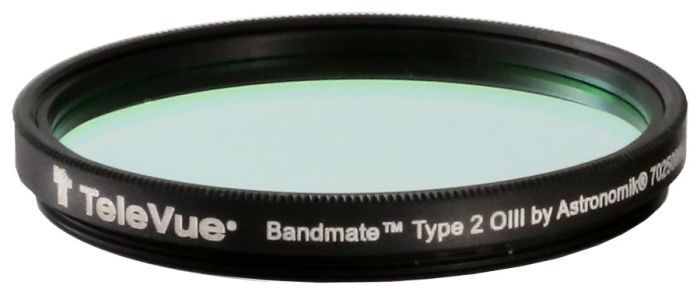
Bandmate IITM Filters are among the quality filters and adapters Tele Vue Optics offers for visual and astrophotography. These filters target low reflections, contrast, and high transmission rates. Additionally available are filter adapters for easy interaction with Tele Vue telescopes and imaging equipment. Another filter manufacturer is an adaptive Optolong L-eXtreme F2 filter.
Highlighted Products
Featured Product 1
The Tele Vue Bandmate 1.25" H-Beta Filter is crafted explicitly for high-contrast imaging of H-beta emission nebulae. Consequently, it enhances the visibility of faint objects, such as the California Nebula. Utilizing a precise bandwidth of 10 nm effectively isolates the H-beta emission line.
Featured Product 3
Building on this performance, the Tele Vue Bandmate OIII 2" Filter is designed to improve the observation of oxygen-III emission nebulae. It achieves this by isolating the 495.9 nm and 500.7 nm lines, unveiling faint structures in nebulae like the Veil Nebula and Ring Nebula.
More About This Category
Tele Vue Optics has built a reputation as a maker of fine astronomical accessories, offering various filters and filter shams. These components effectively contribute to increasing the performance and flexibility of telescopes, making them vital tools and instruments in astronomy among both novices and experts. Now, it is time to look deeper into Tele Vue filters and filter adapters and discover their importance to astronomy.
What are Tele Vue Filters and Filter Adapters?
Tele Vue filters are high-quality accessories for telescopes intended to transmit only a certain type of light while blocking other types of light. These filters are mainly used to increase contrast, reduce glare, and observe celestial objects. Filter adapters help fix filters on almost every type of telescope's eyepiece and any imaging system, providing a proper and firm fit.
Importance of Filters and Filter Adapters in Astronomy
Filters are crucial in astronomy for several reasons:
1. Enhanced Observation of Celestial Objects:
Narrowband Filters: These filters, H-alpha, OIII, SII, etc., help choose certain colors emitted by astronomical objects like the nebulae. They improve these objects' visibility as they contrast well against the blackness of space.
Broadband Filters: Among them are LPR filters that minimize the wavelengths that characterize artificial light so people can view deep-sky objects instead of observing stars in urban areas.
2. Solar Observation:
Solar Filters: Unique H-alpha filters enable safe solar viewing, observing details such as sunspots, flares, and prominences. Similarly, Tele Vue's solar filters protect the observer from dangerous ultraviolet and infrared radiation.
3. Planetary Observation:
Color Filters: These filters help enhance the demarcation of the given specifics of the attributes of planets since color signals are filtered out. For example, a red filter assists learners in showing the surface structure of the red planet Mars or the moon; in contrast, a blue filter assists in identifying structures in the gaseous planet Jupiter or any gaseous planet and its moons.
4. Astrophotography:
Imaging Filters: Filters help astronomers obtain good images of objects of interest in the context of astrophotographers. LRGB (Luminance, Red, Green, Blue) filters enable simultaneous photographing of distinct wavelengths and merging photos later during image processing.
Filter adapters are equally important as they enable the seamless integration of filters with telescopes and cameras. The key benefits include:
1. Versatility:
Tele Vue filter adapters easily fit many eyepieces and imaging systems because they are recommended for all Tele Vue oculars and others. Adapters ensure that filters are securely attached, preventing any movement that could affect the quality of observations or images.
2. Convenience:
Filter adapters allow filter exchanges in the shortest time possible, meaning little time is consumed while observing filters. This ensures that the price of filters does not go wasted because the astronomer can switch these with some other telescopes and eyepieces.
Products like filters and filter adapters offered by Tele Vue Optics are critical components in astronomers' tool kits. These components increase the ability to observe and image celestial objects by increasing the contrast, reducing light pollution, and allowing a safe view of the sun. Narrowband filters are most beneficial for deep-sky observing, and color filters reveal the enhanced features of planets. Solar filters enable the safe examination of solar activities, and broadband filters permit the observation of deep-sky objects from sea light-polluted areas.
Filter adapters add extra functionality and can be considered as a fastening device to guarantee the properly fitted filter on different eyepieces and other imaging equipment. This versatility is ideal, especially for astronomers who swap positions frequently or switch between various telescopes/imaging equipment. Since some filters can be changed quickly, the astronomer can make the most of the observation sessions by decreasing interactions and intermission.
Tele Vue filters and filter adapters are equally significant in astronomical observing and imaging evolution. They enable astronomers to see space in greater detail and from angles not possible through the naked eye, which is necessary when studying nebulae, mapping the surface features of planets, or investigating the sun's activity. Using only high-quality filters and adapters by Tele Vue guarantees that astronomers are getting the most out of their telescopes and can continuously make groundbreaking findings in astronomy.
Why are narrowband filters important for deep-sky observations?
Undoubtedly, a narrowband filter is required as these produce certain specific wavelengths of light from the nebula and other deep sky objects. Also, it improves the difference and visibility since it suppresses the other wavelengths, including light pollution, making the fainter objects visible.
Can using a solar filter be useful during observations at night?
No, sun filters are special filters for observing the sun, so they cannot be compared with other filters used in astronomy. They exclude injurious factors in the sunlight and are ineffective in night observations. If used at night, most of the light would be inhibited, thus eradicating the visibility of stellar objects.
How do color filters improve planetary observation?
Color filters improve planetary observation by enhancing specific features. For example, a red filter can improve the contrast of Martian surface features, while a blue filter can enhance the visibility of Jupiter's cloud details. Each color filter emphasizes different aspects of planetary surfaces and atmospheres.
What is the advantage of using filter adapters?
Filter adapters provide a secure and precise fit for filters on various eyepieces and imaging devices. They allow astronomers to switch between different filters quickly, enhancing the flexibility and efficiency of their observational setup.
Are Tele Vue filters suitable for astrophotography?
Yes, Tele Vue filters are highly suitable for astrophotography. They offer high transmission rates and precise wavelength isolation, which is essential for capturing high-quality images. LRGB filters, in particular, create true-color images by capturing different wavelengths separately.
Here are few of the brands' bestsellers.
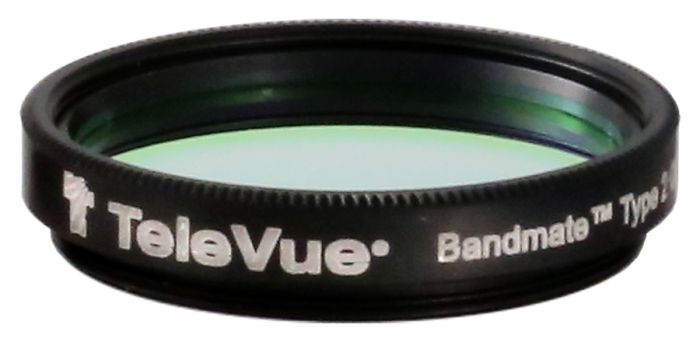
Tele Vue 1.25" OIII Bandmate Filter- The filter reduces light to specific OIII emission wavelengths (500. 7 nm) emitted by planetary and emission nebulae, improving the contrast of faint nebulosities against the black background. It also enhances contrast by removing other colors, making nebulae more visible. The filter reduces light pollution, allowing nebulas to be discerned in areas with high pollution. Additionally, it reduces the bandwidth, excluding artificial lights, making the view more enjoyable.
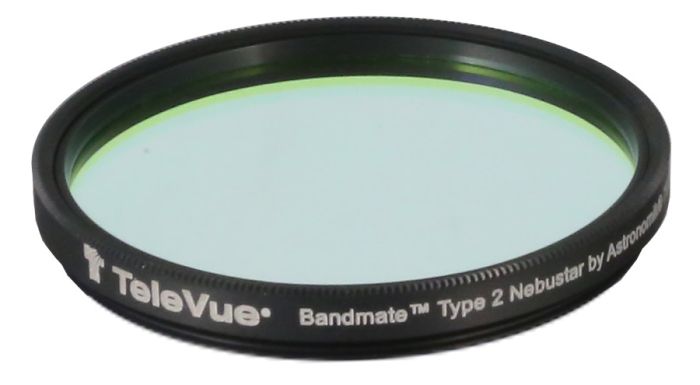
The Tele Vue Bandmate Type II Nebustar UHC 2” Filter should be a must-have for everybody who wants to improve his visual observations of deep-sky objects, especially nebulas. Naturally, its narrowband design, the best-in-class optical coatings, and light pollution correction make the filter set a must-have in any astronomer’s arsenal. Thus, due to contrast and visibility enhancement, it provides a richer and more entertaining night view that is valuable for initiating visual astronomical and photography purposes.
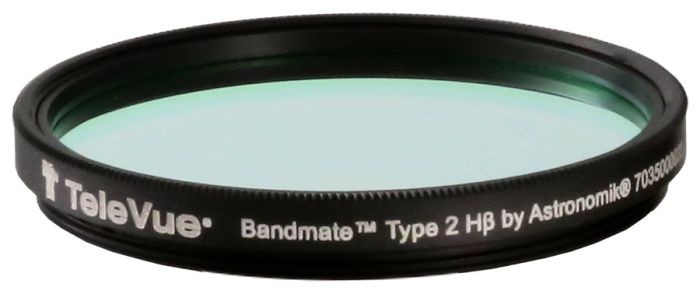
Being a planetary filter that works best at high powers with long eye relief, the Tele Vue Bandmate 2” H-Beta Filter is a must-have piece of equipment for any astronomer who’s into deep sky photography with plans to photograph faint emission nebulae. The H-Beta line reduction increases the contrast and definition of these objects, bypassing light pollution effects and generally providing a better observing experience. Another tremendous capability of the product is compatibility with most equipment, along with its reliable construction and user-friendly nature, which is beneficial for any astronomer.
